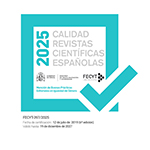Adaptación transcultural del Multilingual Assessment Instrument for Narratives (MAIN) al español de Chile
Resumen
El objetivo principal de este estudio fue realizar la adaptación transcultural al español de Chile del Multilingual Assessment Instrument for Narratives – MAIN, una herramienta de evaluación narrativa disponible en diversas lenguas. El proceso consideró seis etapas: traducción directa, síntesis, retrotraducción, revisión y versión preliminar, pilotaje, informe final y presentación al comité de expertos. La adaptación prestó especial atención a aspectos léxicos, gramaticales y culturales para asegurar la comprensión y familiaridad del instrumento en el contexto cotidiano de los niños chilenos, sin comprometer la estructura y el formato original de la prueba. De acuerdo con estudios previos en otras lenguas, los resultados del pilotaje mostraron un incremento en el desempeño de las categorías de producción narrativa con la edad de los niños de 4 a 7 años 11 meses. En cuanto a la comprensión, se observó una mejora con la edad, alcanzado un punto máximo alrededor de los 6 años. Estos hallazgos coinciden con investigaciones anteriores realizadas con el MAIN. La disponibilidad de una herramienta común adaptada a diferentes lenguas facilita la comparación y el intercambio de datos entre profesionales e investigadores de diversos contextos lingüísticos y culturales. Este trabajo también fomenta la adaptación del MAIN a otras lenguas habladas en Iberoamérica, abriendo la posibilidad de evaluar combinaciones lingüísticas que no suelen ser consideradas en la actualidad.
Descargas
Licencia
La Revista de Investigación en Logopedia, para fomentar el intercambio global del conocimiento, facilita el acceso sin restricciones a sus contenidos desde el momento de su publicación en la presente edición electrónica, y por eso es una revista de acceso abierto. Los originales publicados en esta revista son propiedad de la Universidad Complutense de Madrid y es obligatorio citar su procedencia en cualquier reproducción total o parcial. Todos los contenidos se distribuyen bajo una licencia de uso y distribución Creative Commons Reconocimiento 4.0 (CC BY 4.0). Esta circunstancia ha de hacerse constar expresamente de esta forma cuando sea necesario. Puede consultar la versión informativa y el texto legal de la licencia.












